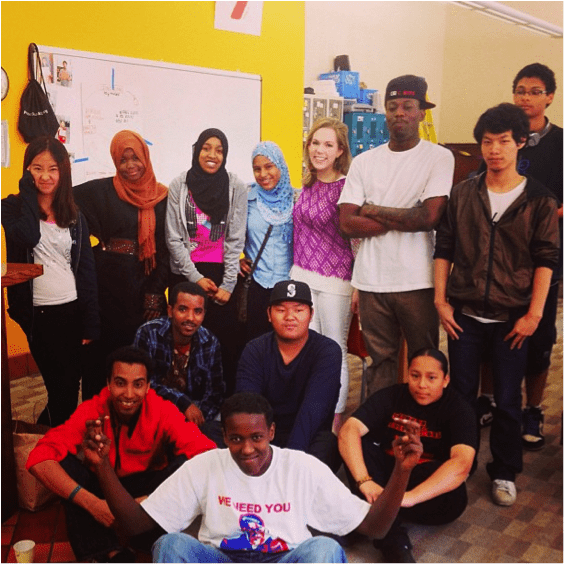This post was written by Emma Margraf, a foster parent and advocate.
I am a busy mom. I’m not the only one, I get that. I have great admiration for the moms who stay on target and keep up with everything all the time, but I am certainly not one of them. Judgment is one of the things about parenthood that I was not prepared for, and I have a knee jerk argh reaction whenever I run across completely unnecessary expressions of the inability to see things from another person’s perspective. A busy person, who, maybe, flat forgot about the bake sale and the form required to get her into band. But that’s a different story. A few weeks ago (I’m behind on … my life … but we covered that) I read this story, and it’s been bugging me ever since.
I am so busy that I have become one of those people that mostly gets my news from what my friends posts on Facebook – and because I am who I am I clicked on this story after I’d seen it pop up a few times … and as the kids say, OMG.
Can’t we all just get along?
The story’s premise is that we, as parents, should take all of this on face value. These are instructions … but I am not in school. There are aspects of being a parent that require this conversation to be a conversation, not a test.
First of all: you all are leaving the profession in droves because you can’t stand the parents? Really? It’s my fault? That’s quite a burden — and one I would think I and other parents share with a thousand other factors, many of which are caused by people who could help and don’t – they just watch us fight with each other.
Trust us, you say. Approach a conversation about a concern by saying “I know kids exaggerate”, you say. If you are telling us something, it’s true, you say, so you just have to believe it and back it up. The problem here is that we’re with our kids for a lifetime – you have them for a year, or a couple of years, or an hour a day. If a teacher tells me something happened I am absolutely going to verify it, because Jane needs to know that I am in her corner. Every public school situation she’s been in has been big and crowded and full of opportunities for overworked teachers to miss things that are important — and there is no way that I am going to punish her for something without gathering as many facts as possible.
What few teachers will admit to me is this: teachers have favorite students. When I first got Jane she had a lot of habits that made her, um, not their favorite. I understood why, and I didn’t fault them for it. She was frustrating. This was painfully clear to me as I watched the 8th grade graduation ceremony and all the clearly popular kids got hugs and high fives from every teacher as they walked by with their diplomas, and the loners, the awkward children, the children that clearly struggled got semi-engaged handshakes or were left to just walk on by. Teachers who had Jane when she had behavior problems universally took the side of other children when Jane was in an altercation, even when there were no adult witnesses and clearly there was more to the story than was being told. She was frustrating, but not every problem was her fault.
Now, don’t get me wrong. There are a handful of teachers that I would walk miles barefoot in the snow for. Jane told me once that one of those teachers was mean, and I knew she’d gotten in trouble with him that day and I said, “No way, you’ll have to try harder than that—he’s the nicest teacher you’re likely to have for a great while, and you need to treat him with respect.”
Those moments don’t hold their weight if you do support teachers when it isn’t warranted. Jane had a terrible teacher last year that shortchanged her and didn’t think she was capable of much. I really couldn’t lie to her and say the teacher was worth respecting. She wasn’t. What I did say was that I’ve had bosses I didn’t like and who didn’t like me, and that didn’t change the fact that I needed to do everything on my job description — regardless of personality.
Teachers have hard jobs. I’ve seen that. I have a hard job too, in addition to being a foster parent. I am always struggling to stay ahead of the game, and in that struggle, I remind myself that her educational success and happiness is most important. I support every teacher who has supported Jane. I support every school that has listened to her. I support every situation that has asked her to be the best person and student she can be. Blind support helps no one, especially Jane.
In the decades I have to spend with Jane, I’d like her to think that I was the one that convinced her to be the best version of herself. I’d like for my relationships with her teachers to reflect that wish. I don’t see that in this article. I don’t see that in the mainstream media. How do we make this the highest priority?
 Beth Richer first worked with the League of Education Voters (LEV) as a consultant with the Youth & Families Initiative. She returned full-time in 2010 after managing Rep. Marcie Maxwell’s (successful) re-election campaign to help LEV grow and build relationships with Washington legislators. While at LEV, Beth’s work focused primarily on issues that directly correlate with closing the opportunity and achievement gaps for Washington’s students.
Beth Richer first worked with the League of Education Voters (LEV) as a consultant with the Youth & Families Initiative. She returned full-time in 2010 after managing Rep. Marcie Maxwell’s (successful) re-election campaign to help LEV grow and build relationships with Washington legislators. While at LEV, Beth’s work focused primarily on issues that directly correlate with closing the opportunity and achievement gaps for Washington’s students.![Transforming School Discipline: The Next Step [image of children running]](https://b2881166.smushcdn.com/2881166/wp-content/uploads/2014/03/2014_discipline_levinars-300x184.jpg?lossy=1&strip=1&webp=1) During the 2013 legislative session, many of you helped us pass a law (SB 5946) that makes school discipline data public and limits the number of days that students can be removed from class.
During the 2013 legislative session, many of you helped us pass a law (SB 5946) that makes school discipline data public and limits the number of days that students can be removed from class.


 Nicholas Bradford specializes in restorative justice and transforming school discipline. He first became involved with LEV through our discipline work, and he served as part of the panel for our May 2013 community event, “Stop school suspensions: Solutions for safe, secure classrooms without removing kids.”
Nicholas Bradford specializes in restorative justice and transforming school discipline. He first became involved with LEV through our discipline work, and he served as part of the panel for our May 2013 community event, “Stop school suspensions: Solutions for safe, secure classrooms without removing kids.”